Research shows that Australia’s great white sharks are highly related to each other and may consist of fewer than 500 breeding animals. SYDNEY, 24 June 2025: Latest research has found Australia’s great white shark population is much smaller than expected, increasing their vulnerability to further population threats. The population...
It’s 2018, and in Australia an Endangered species is being killed within the boundaries of a World Heritage Site.
If the species in question was a primate, rhino or even a whale one would expect global outrage. But instead, the victim is a shark in the Great Barrier Reef and the slaughter of these animals has gone unnoticed. Until now…

The scalloped hammerhead is listed as Endangered under IUCN, and is harmless to humans. Image: HSI/AMCS/Nicole McLachlan
Humane Society International (HSI) and the Australian Marine Conservation Society (AMCS) have recently obtained images of two scalloped hammerhead sharks hanging dead on drumlines off Magnetic Island in the Great Barrier Reef. The drumlines exist as a part of the Queensland Government’s Shark Control Program. Listed as endangered by the IUCN, scalloped hammerheads are a medium sized shark (2m) with a global distribution. They have never been implicated in an unprovoked attack on a human.
Drumlines are ineffective. The incidence of shark/human interaction is so low, it is impossible to correlate these interactions with the presence or absence of drumlines. It is equally likely that baited drumlines attract more sharks to coastal, populated areas. Better, non-lethal alternatives exist. Drone and aerial surveillance, personal shark deterrents and education all have great value in preventing the shark/human interactions the drumlines claim to defend against. In reality, drumlines provide only a false sense of security, all while killing marine wildlife.

There are better, non-lethal alternatives to drumlines. Image HSI/AMCS/Nicole McLachlan
Drumlines are indiscriminate. Since the program began in the 1960s, countless sharks and rays have been hooked, but in addition, turtles, dolphins and even a whale shark1 have expired on the lines. The vast majority of these animals are harmless, many of them are threatened or endangered, and all are innocent. Even those few that are targeted and potentially dangerous are seriously misunderstood. The sharks that die on the drumlines are integral for ocean health.
Sharks, as large predators, are absolutely essential in maintaining the delicate balance in our ocean ecosystems. They keep populations of smaller animals and herbivores in check, making sure none become too numerous and disrupt the equilibrium. Researchers, scientists and friends of the sea all agree: a healthy ocean is contingent upon healthy shark populations.

HSI is taking legal action against the QLD shark culling program in the Great Barrier Reef. The case will be heard from January 30, 2019. Image: HSI/AMCS/Nicole McLachlan
In essence, endangered sharks are being killed in the Great Barrier Reef in a program whose ineffectiveness is matched only by its cruelty. Humane Society International is represented by the Environmental Defenders Office (NSW) in a case that will be heard this coming January by the Administrative Appeals Court. The case will challenge the merits of an approval that allows the Queensland government to kill sharks in the marine park. While we fight in the courts and the halls of parliament, we need your support. Please sign our petition and remind Queensland that they are stewards of the Great Barrier Reef charged with ensuring the health of the ecosystem in which sharks play a vital role, and that not only Australia, but the world, is watching.
1 – https://data.qld.gov.au/dataset/shark-control-program-shark-catch-statistics/resource/5c6be990-3938-4125-8cca-dac0cd734263
Blog image: Scalloped hammerheads are also under threat from lethal drumlines in the Great Barrier Reef, which are designed to catch and kill sharks. Image: HSI/AMCS/Nicole McLachlan


